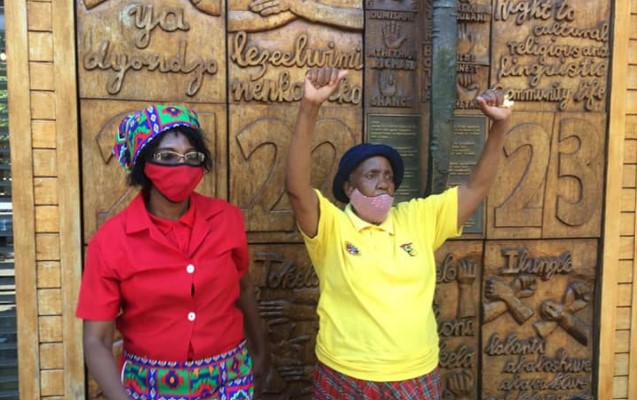
Jun 15, 2021
On June 16 International Domestic Workers Day, domestic workers are celebrating a landmark legal win by South Africa’s domestic workers for colleagues who die or are injured in their employers’ homes. For the first time, starting this year, domestic workers who suffer injury on the job are eligible for compensation for temporary and permanent disability, medical expenses, funeral costs and survivor benefits.
Until last year, South Africa’s approximately 1 million privately employed domestic workers suffered deaths and crippling injuries without access to compensation for themselves or their dependents because domestic workers were excluded from South Africa’s Compensation for Occupational Injury and Illness Act (COIDA). With Solidarity Center support, the South African Domestic Service and Allied Workers Union (SADSAWU) and human rights organization Socio-Economic Rights Institute of South Africa (SERI) litigated and won a long-denied claim for the dependent daughter of Maria Mahlangu, a privately employed and partially sighted domestic worker who had fallen into her employer’s swimming pool and drowned in 2012. The historic judgment, made by the South African Constitutional Court in mid-November, recognized that injury and illness arising from work as a domestic worker in a private home is no different to that occurring in other workplaces and thus equally deserving of COIDA coverage.
Myrtle Witbooi, general secretary of SADSAWU and the first president of the International Domestic Workers Federation (IDWF), said in addition to the last year’s court ruling, South Africa’s domestic workers can also celebrate this year’s hard-fought win under revised compensation rules of three years of retroactivity to submit claims.
Under the new rules, all employers of domestic workers must register with the Compensation Fund or face penalties, and make annual payments to cover their employees. SADSAWU is focusing its efforts on educating employers and domestic workers about their obligations and rights under the new rules, says Witbooi. SERI made a new domestic worker compensation information fact sheet available to domestic workers, paralegals and community advice offices this month, while SADSAWU is producing and distributing an educational WhatsApp video and pamphlet and translating the amendment into local languages.
The unions and SERI continue to press the government for more time for domestic workers to submit claims and increase retroactivity. “We must remain that beacon of hope for workers,” says Witbooi.
Meanwhile, another domestic worker, Nobuhle Ndlovu, drowned in her employer’s swimming pool last month.
Ten years after the adoption of an International Labor Organization (ILO) Convention confirmed their labor rights, domestic workers across the globe are still fighting for recognition as workers and essential service providers, as documented by a new ILO report. And, although 32 countries have ratified Domestic Workers Convention 189, and 29 have entered the convention into force, most of the world’s 75.6 million domestic workers are still being denied social protection rights, including access to national health insurance, pension schemes and compensation funds.
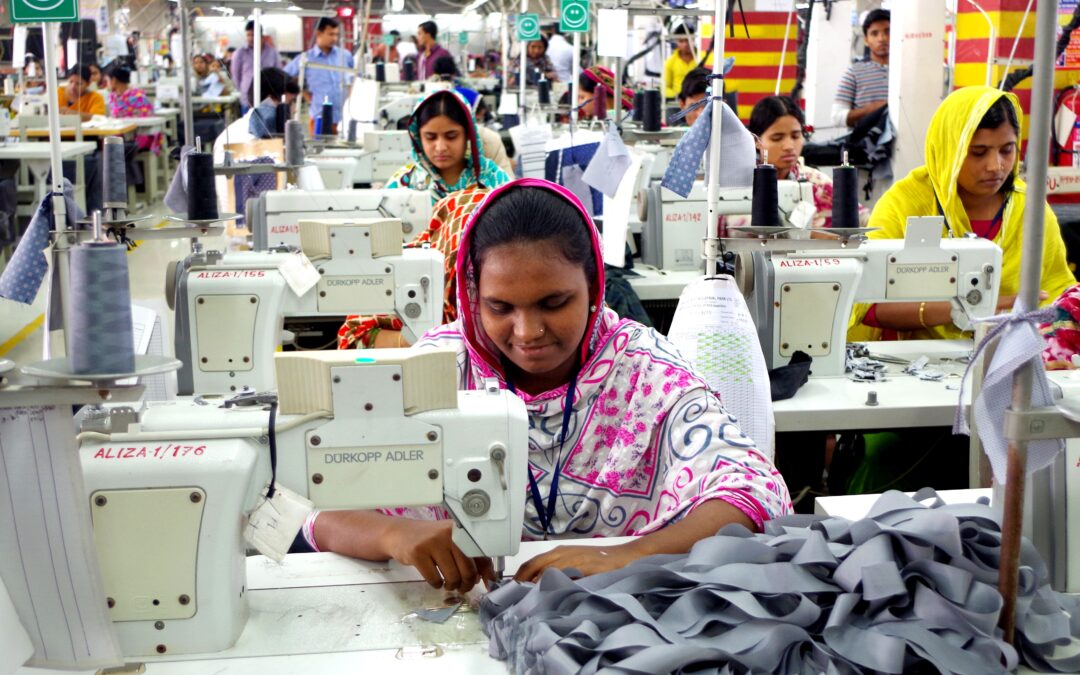
Jun 8, 2021
Worker rights and human rights advocates are urging multinational corporate fashion brands to commit to a binding successor agreement that will continue the pathbreaking work of the Accord on Fire and Building Safety in Bangladesh, a landmark agreement that made factories safer for 2 million garment workers.
Signed by fashion brands and unions in 2013, the Accord was set apart from previous safety agreements because it was legally binding, providing a key enforcement mechanism for workers and their unions to hold individual brands and retailers accountable. As a result, the Accord “has been the most successful safety program in the contemporary history of apparel supply chains,” according to a recent report by a coalition of worker rights organizations.
It was set to expire May 31, but corporate brands agreed to a three-month extension to allow for more time to conclude negotiations on a new binding safety agreement.
Accord Boosted Safety for Millions of Workers
The Accord “actively engaged with unions to ensure that workers voices are heard in the remediation process to ensure safety in the workplace,” says Rashadul Alam Raju, general secretary of the Bangladesh Independent Garment Union Federation (BIGUF).
“In five years, thousands of fire, building and electrical hazards were fixed in the [ready-made-garment] RMG factories,” he says. “As a result, safety standards were uplifted for millions of workers [and] the country has not witnessed any major accidents or loss of life in the factories inspected by Accord.”
The Accord, which now includes more than 190 brands and covers 1,600 factories, was signed after more than 1,100 garment workers were killed in the April 2013 Rana Plaza collapse in Bangladesh. Voluntary programs, with no legally binding enforcement like the Accord, failed to prevent the Rana Plaza collapse or the tragic Tazreen Factory fire that killed more than 100 Bangladeshi garment workers a few months earlier.
Accord Ensured Workers, Their Unions a Voice

BIGUF General Secretary Rashadul Alam Raju says the Accord ensured safety for millions of workers and must be extended. Courtesy Rashadul Alam Raju
Following a 2020 Bangladesh High Court decision, the Accord’s day-to-day operations were handed over to the Ready-Made Garment Sustainability Council (RSC), comprised of brands, factory owners and global and local unions. But the RSC is not legally binding and, “for all intent and purposes, is not going to bring about any real change in the factory conditions,” says Raju.
Crucially, the Accord supported an environment in which workers’ voices could be heard through collective bargaining between unions and employers, enabling unions to protect workers’ safety and ensuring they woud not be targeted by managers for speaking out about their workplace rights.
“The Accord was very much proactive in engaging with the unions in its work to ensure safety for the workers,” says Raju. “This also ensured protection to the workers and unions from being victimized by the employers. But such protection with RSC is virtually non-existent.”
Bangladesh garment workers, primarily women who often are subject to brutal verbal and even physical violence for supporting unionization, were able to form dozens of unions in the wake of the Accord, with tens of thousands achieving first-ever rights on the job.
Raju and other Bangladesh union leaders say the Accord’s signatory brands must agree to a new binding safety agreement that ensures safe work, remains individually enforceable upon brands, keeps an independent secretariat in place that oversees the brands’ compliance and allows for expansion to other countries.
Although brands committed in January 2020 to negotiate a new binding agreement with the option to expand to other countries, they since have offered only a watered-down version of the Accord.
A renewed agreement is urgently needed, union leaders say, because much work still must be done to ensure factory safety in Bangladesh and around the world. A renewed agreement offers the possibility of expanding factory safety and health to other countries, where recent disasters underscore the need to address life-threatening work environments.
The bottom line, says Raju, is that unions must be part of any new agreement, “but it has to be legally enforceable.”
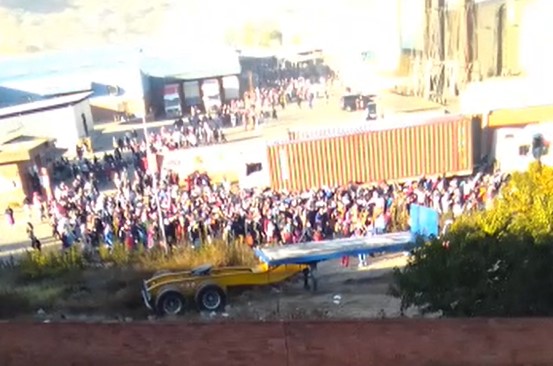
Jun 2, 2021
A police crackdown against Lesotho garment workers protesting a two-year delay in scheduled minimum wage increases resulted in two fatalities in Maseru, the capital, last week. Pitso Mothala and Motselisi Ramasa died as police fired into the crowd. Many more workers were injured.
The deaths come after two weeks of escalating state-sponsored attempts to use shootings, beatings and arrests to force thousands of the country’s 50,000 garment workers to return to their factories. Meanwhile, government ministries have rejected union attempts to negotiate an end to protests and are still refusing to provide garment workers with the wage increases they need to sustain themselves and their families through the COVID-19 pandemic, reports United Textile Employees (UNITE).
“We want justice for our brutal[ally] killed comrades and we shall forever make sure that their blood is not in vain,” says a UNITE media release that identifies the two slain garment workers by name. Garment workers remain at home this week while the country’s armed forces continue to patrol the industry, reports the union.
The country’s unions are refusing to return to work until the government makes good on two missed incremental minimum wage increases—for 2020/2021 and 2021/2022—that have been delayed indefinitely.
Lesotho has a long history of human rights violations against political and labor activists, including police violence against peacefully striking factory workers rallying for fair wages last year. The 45th annual U.S. Department of State, Bureau of Democracy, Human Rights and Labor Human Rights report on Lesotho found that members of the Lesotho Mounted Police Service and Lesotho Defense Force last year committed numerous human rights abuses, including “unlawful or arbitrary killings; torture and cases of cruel, inhuman, or degrading treatment or punishment; harsh and life-threatening prison conditions [and] arbitrary arrest or detention.”
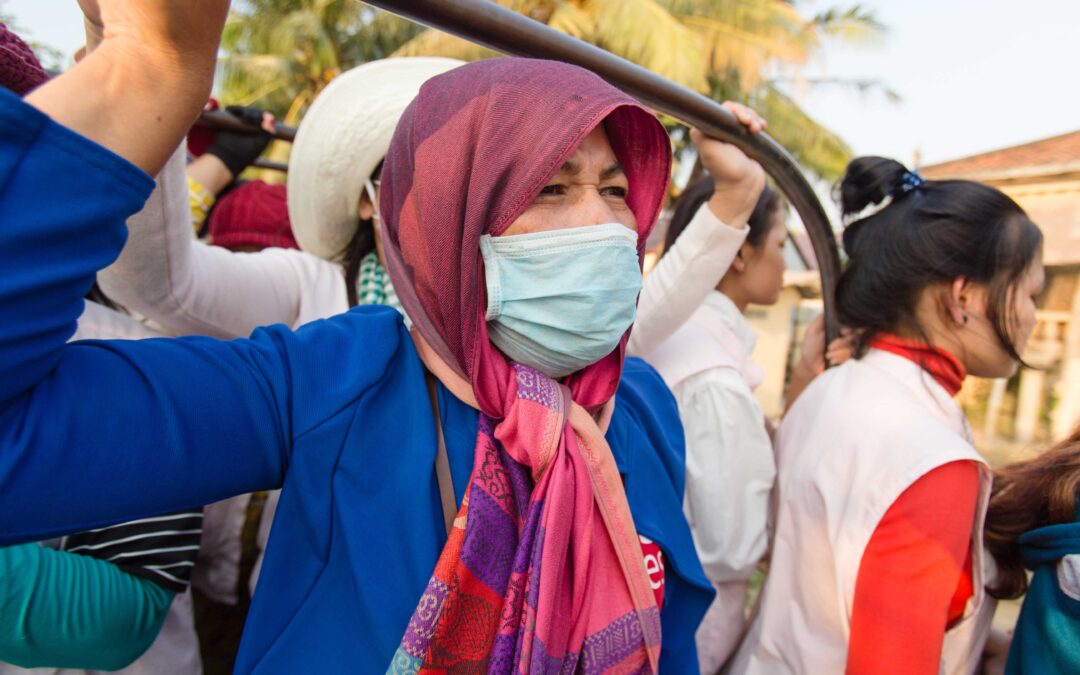
Jun 1, 2021
Half or more workers in key Cambodian industries were suspended for three or four months, and most were unable to support themselves on government aid during the pandemic, according to a new study that put hard data to the suffering of the country’s low-wage workers.
Some 53 percent of those working in tourism were suspended for an average 15 weeks, and 40 percent of workers in Cambodia’s garment and footwear industries were suspended for an average of 11 weeks, according to a survey of 1,525 workers by the Center for Policy Studies. Solidarity Center and The Asia Foundation supported the research, which reports results from July and August 2020. (See the full survey.)

Women workers in Cambodia worked more and were still paid less than men during the pandemic. Source: CPS/Solidarity Center/Ponlok Chomnes
Women comprise the majority of workers surveyed and are the majority of 800,000 workers in the country’s garment and footwear industries. Before the pandemic, women were typically paid less than men. Yet, even when they returned to work in July 2020, they reported being paid less than men even though they worked more days than men.
All workers who returned to the job by July 2020 on average were employed for fewer hours and earned less than in July 2019.
COVID-19 an Excuse to Exploit Workers
Although many businesses were forced to temporarily suspend operations or shutter permanently during Cambodia’s first wave of COVID-19, some employers took advantage of the pandemic to lay off workers, union leaders say.
Further, hospitality and garment workers who returned to, or remained on the job, were not provided adequate personal protective equipment (PPE) or measures to ensure their safety, according to union leaders in Cambodia. Unions have been organizing to hold employers to account, negotiating for better protection measures.
Government Support Helpful, Not Sufficient
To assist garment and tourism workers during the country’s first wave of COVID-19, the Cambodian government launched several programs, including financial support for workers suspended from the job and a skills improvement training program. But workers interviewed for the survey said the suspension payments, which ranged $40 to $70 per month, were not sufficient to cover the roughly $69 they needed for basic monthly food expenditures.
Half of those surveyed say the suspension allowance was their only income, and more than 50 percent said they could not afford to send remittances to their family as a result of pandemic-related losses. Between 40 percent and 60 percent of workers surveyed say they took on debt to survive.
The government announced in July 2020 that businesses closed during COVID-19 were not required to pay workers hardship or layoff wages. Tourism sector operations also were not required to contribute the $30 per month toward the suspension payments. The government provided $40 per month.
Urgent Action Needed for New Pandemic Wave
Since February, Cambodia has experienced its worst COVID-19 outbreak, which has led to a deepening crisis for workers as many major cities and several provinces have been in strict lockdown.
During the pandemic, workers in many industries have been left out of public social protection programs, such as health coverage, and the survey recommends extension of these benefits for the most vulnerable.
The survey also recommends expanding skills improvement training programs and funding opportunities for temporary jobs.
Without such support, garment workers like Eang Malea are returning to their factories despite the risk of contracting COVID-19.
“I need to pay rent, utilities and debts, ” Malea, 26, said. “I worry that I will get infected by going to work without being vaccinated, but I don’t really have a choice.”
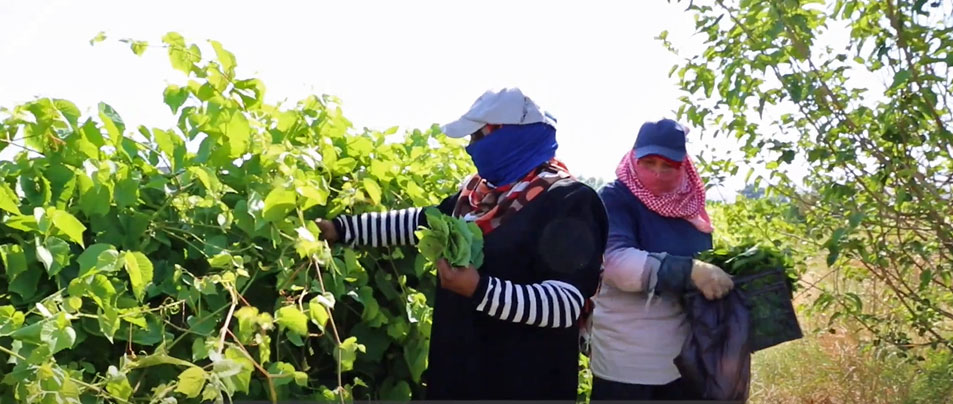
May 21, 2021
بالعربية
Agricultural workers in Jordan for the first time have fundamental protections on the job, including guarantees for safe and decent working conditions, following a two-year campaign by the Agricultural Workers Union in Jordan and its allies that resulted in passage of a historic regulation covering the agricultural sector.
“This is quite a landmark in Jordan. It’s the first time this type of legislation has passed,” says Hamada Abu Nijmeh, director of the Jordan-based Workers’ House for Studies. Under the regulation, any provision not mentioned falls under purview of national labor code.
The law applies to all workplaces that employ more than three agricultural workers, who now will receive 14 days annual paid leave and 14 days paid sick leave (or more, in cases of serious illness). Women are guaranteed 10 weeks paid maternity leave and there are now first-ever provisions for overtime pay. Significantly, the legislation also covers migrant agricultural workers, who frequently are not protected by countries’ labor laws.
COVID-19 Makes Visible Essential Workers

Agricultural workers in Jordan were key to developing the new labor regulation improving wages and working conditions.
Prior to passage of the regulation this month, there were no mandated safety inspections of farming facilities, leaving workers vulnerable to dangerous and unhealthy working conditions, such as exposure to poisonous pesticides. Agricultural workers, most of whom do not have formal labor contracts and are part of the country’s vast informal economy, were paid extremely low wages with no health insurance or other social protections. Working long hours, they were not guaranteed a day off during the week and not paid overtime. They were denied the freedom to form unions—the Agricultural Workers Union is not recognized by the government. Migrant workers still do not have the right to form unions under the new law.
Although a labor law covering agricultural workers was passed in 2008, the government never moved to put it in place, says Mithqal Zinati, union president. But as the COVID-19 pandemic highlighted essential workers like those who literally feed the world, the government became more receptive to the union’s campaign to ensure decent working conditions in the vineyards and fields.
“The agricultural sector is the food basket, the key source of stability that needs to be given priority to contribute to the stability of Jordanian state itself,” says Abu Nijmeh. “Part and parcel of that is to provide protection of workers. We told [the government] if you want to see this sector successful, you need to provide its protection.”
Abu Nijmeh and Zinati spoke with the Solidarity Center through interpreters.
Danger on the Job and Getting to Work
For Jordan’s 210,000 agricultural workers, more than half of whom are women, the day begins before dawn as they rush to meet the crowded trucks that transport them to the fields in the fertile Jordan Valley. Picking cucumbers, melons and okra in summer, citrus fruits in winter, the workers also weed fields, install water pipes and spray crops. They often are denied breaks, even as they work in the burning sun and harsh cold, and women have no access to toilets, leaving many with serious kidney issues and other illnesses, says Zinati. Just this week, a worker died of sun stroke in the fields, Zinati says.
Before they even arrive at the farms, women are subject to unsafe conditions on the packed vehicles they must use to get to work. Some 86 percent say they were involved in an accident on the commute, and 41percent say they are subjected to sexual harassment and other forms of gender-based violence during the journey, according to a study by SADAQA, a nonprofit organization championing the rights of women in Jordan. SADAQA produced the study, “Women Agricultural Workers in the Jordan Valley: Conditions of Work and Commuting Experiences and Challenges,” with Solidarity Center support.
Twenty or more workers are packed in a van licensed for five passengers, sitting on top of each other and in the luggage compartment, says Zinati. The vans take back roads to avoid police because they are not licensed, or licensed only to transport crops and other goods, and workers frequently suffer injuries as the overcrowded vehicles crash on the rough roads. Because most women work in shifts, they must commute two times per day, says Randa Naffa, SADAQA co-founder, speaking through a translator.
Together with the Solidarity Center, SADAQA produced a video on the outcome of the study documenting the hazards women face commuting to the fields. SADAQA, part of the Alliance to End Gender-Based Violence and Harassment in the World of Work, is using the video to campaign for regulations covering agricultural transport. The alliance is pushing the government to ratify International Labor Organization Convention 190 on ending gender-based violence and harassment at work. Convention 190 makes clear that employers and governments must take measures to ensure workers are safe on their work commute as well as in the physical workspace.
Worker Involvement Key to New Regulation
Agricultural workers were key to designing the new regulation. Beginning in 2019, leaders at the union and the Workers’ House met with workers on the farms to determine their needs and priorities. With worker input forming the basis of the draft regulation, campaign leaders applied labor regulations and human rights provisions from international standards and legislation from other countries to create a model regulation. The Workers’ House and the Solidarity Center then organized a meeting of agricultural workers to discuss the draft again and plan campaign steps, including social media outreach.
They formed a coalition with civil society organizations to launch an advocacy campaign that included petitions and public statements to the Ministry of Labor and other government officials which, along with social media outreach to mobilize public support, was key to moving the government to pass the regulation protecting these essential workers.
“I heard from the Ministry of Labor they said they were listening to, keeping abreast of what was spread in the media,” says Abu Nijmeh.
“The regulation that has just been promulgated, we hope it will protect female workers in this sector and it is the opportunity to create the political will to recognize the importance of women’s contributions to the agriculture sector and the importance of women’s contributions to other informal sectors,” says Naffa.
Worker Education Essential for Success
Abu Nijmeh, Zinati and Naffa all emphasized the need to ensure implementation and enforcement of the new regulation, especially workplace inspection, safety and health and child labor. Under the new regulation, children younger than age 16 cannot work in agriculture and those between ages 16 and 18 can only be engaged in non-hazardous work.
The regulation “shall never be enforced without pushing,” says Naffa. “We need to lobby more, engage in campaigns, reach out to the Labor Ministry, the Transport Ministry.” Key to its success is widespread education of agricultural workers about their rights, says Zinati.
A long-time union organizer who began by unionizing court workers in Beirut, Lebanon, Zinati says union committees are now set up in every village, and literacy classes and other education opportunities are offered so workers can better champion their rights.
“If I see people who are done an injustice, who are oppressed, the only way for them to gain their rights is for them to unite,” he says. “This legislation opens the horizon so workers can play a bigger role in pushing their rights,” he says.
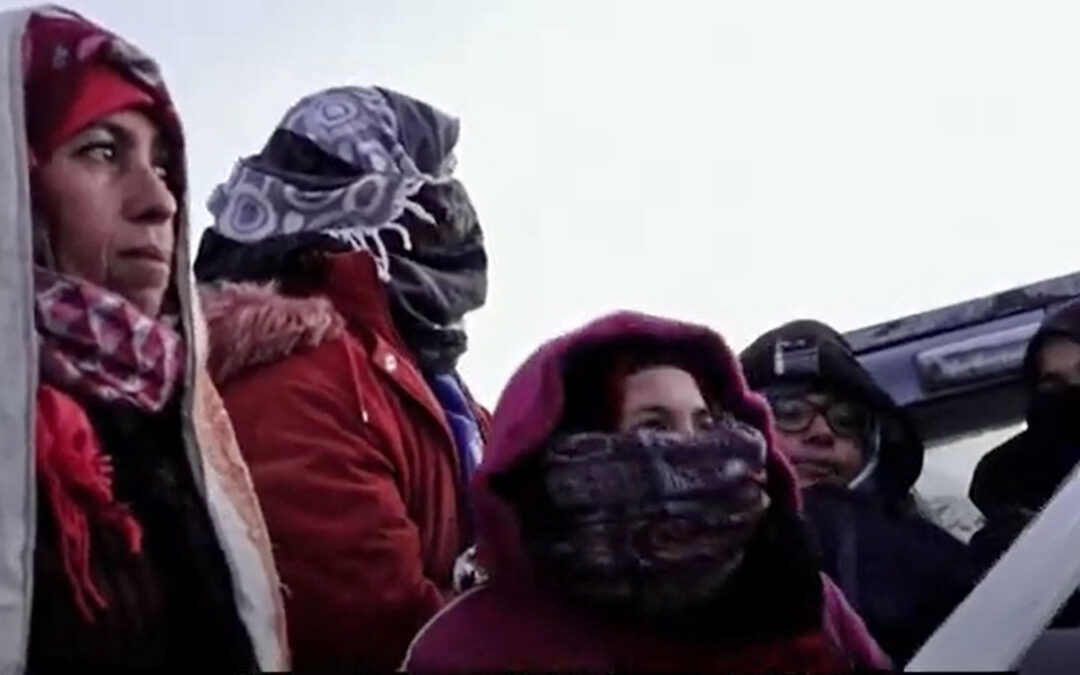
May 20, 2021
While most consumers do not think twice when they select tomatoes, grapes or other readily available fresh produce in grocery stores, many of the agricultural workers around the world who spend their days harvesting vegetables, fruits and grains to fill the plates of others often cannot afford enough to eat.
“Sometimes I might have enough money to buy bread from one of the street vendors; sometimes I might not,” says Mabrouka Yahyaoui, 73, who works in Tunisia’s agricultural fields.
Yahyaoui is among nearly 1.5 million agricultural workers in Tunisia, more than 600,000 of them women, who suffer from high heat in summer and cold rains in winter for more than 10 hours a day, for which their daily wages are between $5.50 and $6. They are forced to give a chunk of their pay for daily transport to the fields in rickety vehicles where women say they are packed together unsafely, subject to sexual harassment, injury and even death. Hundreds of agricultural workers are killed in Tunisia each year as they travel to and from the fields.
“On board the vehicle, we are crammed in like sacks of potatoes, and, worse, the men would be riding along with us,” says Afef Fayachi, a Tunisian agricultural worker. “They would touch us, use swear words, and utter obscenities. Men harass women in every way. And all we can do is suck it up and keep quiet.”
But with the support of the Tunisian General Labor Union (UGTT), agricultural workers in Tunisia are standing up for their rights to safe transport, fair wages and decent work.
‘Invisible’ Essential Workers Demand Safe Work

Despite lack of protections against COVID-19, agricultural workers like Yasmina Yahyaoui risked their lives to support their families.
While the world became aware of “essential workers” during the COVID-19 pandemic, many remain out of the public’s eye, struggling to support themselves with few protections against contracting COVID-19.
“I can’t afford to buy a face mask for four dinars [$1.67] on a daily basis,” says Mayya Fayachi, who, like most agricultural workers, had to risk her health to support her family. As Yasmina Yahyaoui says, “How are we going to make a living if we stay at home?”
In Siliāna, an agricultural town in northern Tunisia, the Federation of Agriculture, a UGTT affiliate, is assisting workers in understanding their right to safe transportation and social protections like safety and health measures to protect against the deadly pandemic. Together with the Solidarity Center, the union worked with the women there to create a video in which they describe the unsafe and dangerous conditions they endure to get to work and home.
“The pains, the grief and privations of these wonderful, hardworking women can be channeled, transformed, into a fabulous resistance and an overwhelming will to overcome,” says Kalthoum Barkallah, Solidarity Center senior program manager for North Africa, who has led the Solidarity Center’s outreach among agricultural workers.

The Tunisian government is taking action in response to the union campaign to improve transportation for agricultural workers.
The video is part of the union’s campaign to build public support for improving the working conditions of agricultural workers and to urge the government ensure decent transportation—for instance, by providing small business loans to local entrepreneurs to operate vehicles that meet safety standards. The new International Labor Organization (ILO) regulation (Convention 190), which covers gender-based violence and harassment at work, makes clear that employers and governments must take measures to ensure workers are safe on their work commute as well as in the physical workspace.
Since the campaign launched, the Minister of Transportation has begun work on formalizing agricultural worker transport and called on governors to form a regional advisory commission to create a new category of license permits for the agricultural sector.
The government and unions also met in March for a first-ever regional symposium organized by the Ministry of Social Affairs on social dialogue and employment relations in the agricultural sector.
Wage, Equity and Respect
The campaign builds on surveys of, and discussions with agricultural workers in Jandouba, Kasserine, Manouba, Sidi Bouzid, Siliāna and Sousse about the conditions they face on the job, including sexual harassment and other forms of gender-based violence.
Workers also have helped formulate bargaining proposals around wages and working conditions, mechanisms for dispute resolution, promotion of workplaces free of violence and harassment, as well as mechanisms for ongoing social dialogue at workplace level.
At the national level, UGTT and its civil society partners are pushing for enforcement of workplace safety inspections laws, which employers are legally obliged to undertake.
Women agriculture workers also point to the need to address disparate treatment in wages and job opportunities between men and women. “The number of daily hours a woman worker is supposed to work must be clear, and how much she gets paid for that work must be clear as well,” says one agricultural worker.”
“Why are men getting paid at least 25 dinars ($9-$10) while I get paid 15 dinars ($5.50), of which I have yet to pay for transportation?” asks Aziza Guesmi.
The bottom line, says Fayachi, is about respect: “I ask for nothing but my rights.”











